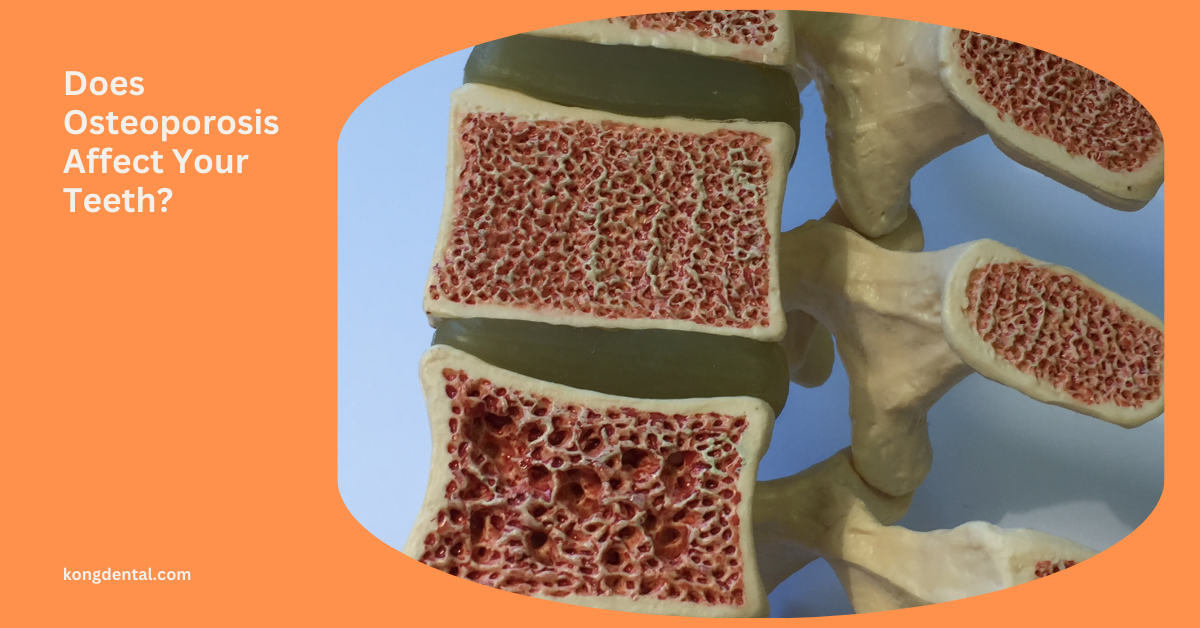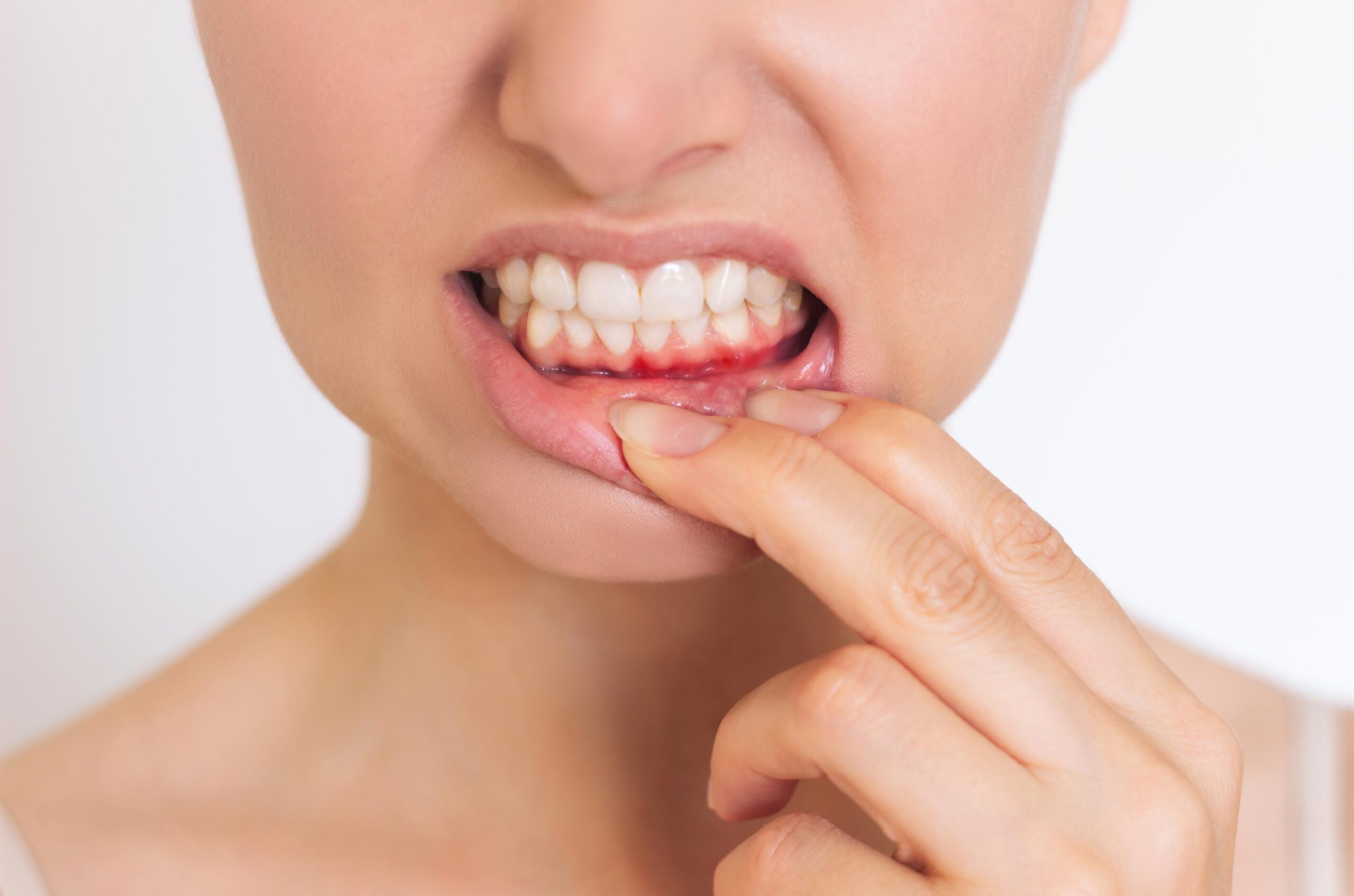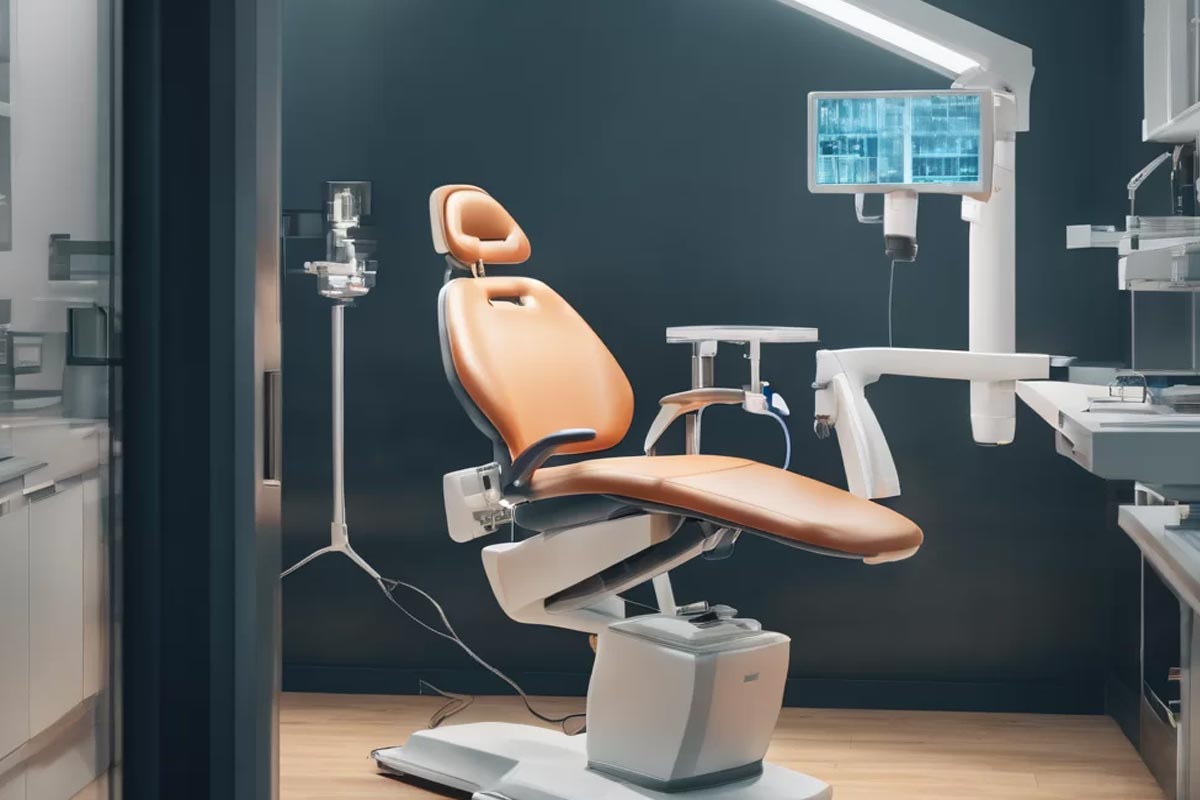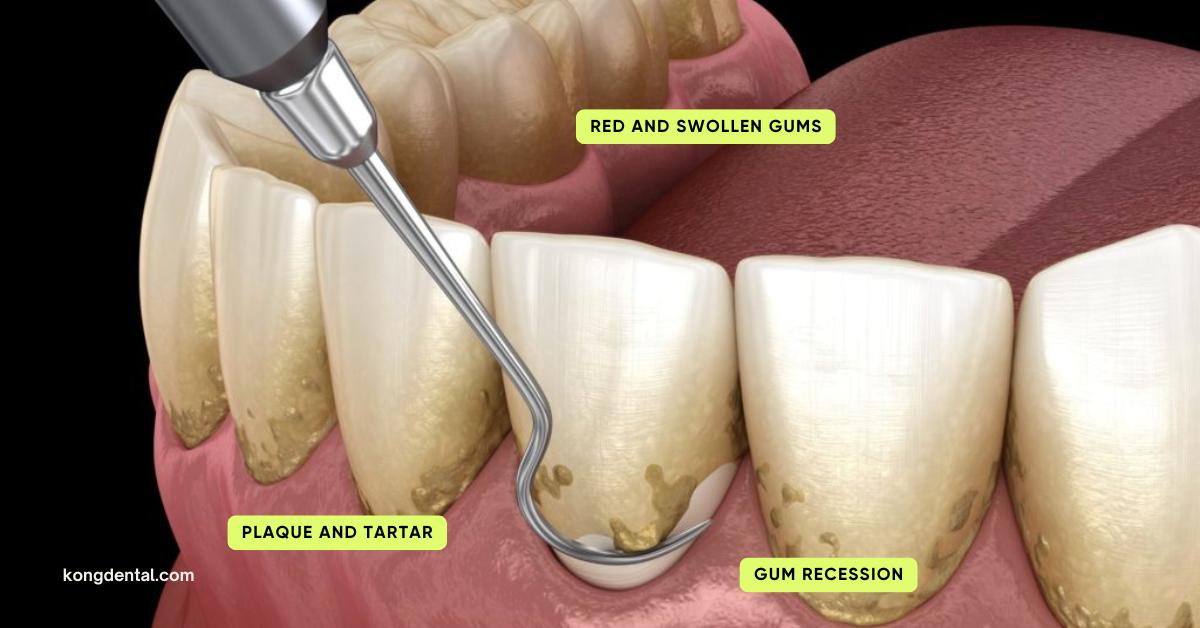Does Osteoporosis Affect Your Teeth?

Osteoporosis does affect your teeth. People with osteoporosis are at a higher risk of tooth loss. This is because of the lower bone mineral density in the jaw and facial bones. Osteoporosis can cause bones to become more fragile, increasing the risk of fractures.
I have written this article to help you better understand how osteoporosis can affect your teeth. This article also contains suggestions for preventative actions you can take to protect your dental health if you have osteoporosis.
Can Osteoporosis Affect Your Teeth?
Yes, osteoporosis can affect your teeth. Research has shown that bone disease is closely associated with poorer oral health. This includes the development of periodontal (gum) disease, decreased jaw bone density and potential tooth loss.
How does bone loss affect my teeth?
Bone loss can not only cause aesthetic changes but also affect the functionality of your teeth. Most patients who have significant bone loss might appear to have sunken cheeks and gaps between teeth. These gaps between teeth can create difficulties in brushing or removing plaque from your teeth effectively which can lead to dental cavities.
Does osteoporosis cause tooth decay and cavities?
Osteoporosis does not directly cause tooth decay or tooth cavities. Teeth are not bones. As such, osteoporosis cannot directly change the health or composition of your teeth. While some studies have found a link between osteoporosis and cavities, there is no causal relationship established.
This does not mean that you should forego a visit to the dentist for an annual dental checkup. Osteoporosis has an indirect impact on your oral health. The most common impact is the weakening of bones and the reduction of bone density. When this happens, it can affect how your teeth are being held in place.
Book an appointment with Kong Dental Surgery to check on your dental health.
How Does Osteoporosis Affect Your Teeth and Gums?
There might seem to be little in common with osteoporosis and your general oral health. If you think this way, you are one of many patients I meet that have this misconception. After all, teeth are not bones, and osteoporosis is a bone disease and should not have an impact on teeth. Unfortunately, that is further from the truth. Osteoporosis does not just weaken your hip, arm and leg bones but affects your oral health.
Here are some ways osteoporosis can detrimentally affect your teeth and gums:
Reduction in jawbone density
Osteoporosis-induced jawbone reduction may lead to dental issues, increasing the risk of tooth loss due to insufficient mineral density. This can complicate the use of dental replacements such as implants, dentures, and bridges, as weakened bones may not provide adequate support. Jawbone loss may contribute to facial collapse, accelerating signs of premature ageing.
Higher risk of tooth loss
Studies indicate a correlation between osteoporosis and tooth loss. Variables such as your age, your race, whether you smoke, whether you are currently having menopause, your oral hygiene and hormonal factors can also contribute to that risk. In a specific study involving postmenopausal South Indians, 39% had osteoporosis. Among these individuals, over half exhibited subpar dental health, with 43.5% having cavities and 75% experiencing tooth loss.
Higher risk of gum disease
Periodontitis, an advanced form of gum disease, and osteoporosis share characteristics of bone resorption (bone shrinkage and loss). Numerous studies establish a connection between these conditions, with each disease posing a potential risk factor for the other.
Does Osteoporosis Medicine Affect Teeth?
The quick answer is that certain medications used to treat osteoporosis can affect your teeth. Antiresorptive medication has been known to cause a condition called osteonecrosis, a rare but severe condition that can damage your jaw bone.
How To Prevent Bone Damage and Tooth Loss from Osteoporosis?
Preventing bone damage and tooth loss associated with osteoporosis involves a combination of lifestyle changes, good oral hygiene practices, and medical management. Here are some recommendations that you can start on:
Regular Dental Check-ups: Schedule regular dental check-ups to monitor your oral health. Dentists can detect early signs of bone loss and provide appropriate guidance.
Consuming a Balanced Diet: Consume a diet rich in calcium and vitamin D to support bone health. Dairy products, leafy greens, nuts, and fortified foods are good sources.
Engage in Regular Exercise: Engage in weight-bearing exercises and activities that promote bone density, such as walking, jogging, or strength training.
Quit Smoking: If you smoke, quitting can improve your overall health, including your oral health. Smoking is a risk factor for osteoporosis and gum disease.
Limit Alcohol Consumption: Excessive alcohol intake can contribute to bone loss. Limit alcohol consumption to promote bone health.
Good Oral Hygiene: Brush your teeth twice a day, floss regularly, and use an antiseptic mouthwash. This helps prevent gum disease and reduces the risk of tooth loss.
Bone Density Testing: Discuss bone density testing with your healthcare provider, especially if you’re at risk for osteoporosis. Early detection allows for timely intervention.
How can I slow down bone loss in teeth?
There are a number of ways that your dentist or dental specialist can help slow down bone loss in teeth:
Bone or gum grafting
This treatment involves building or generating bone and gum tissue around and between your teeth. It is typically used for pre-dental implant treatment for patients who have insufficient bone density.
Composite bonding
In some cases where gaps are smaller, it is possible to use a special kind of dental resin to seal up the gaps between the teeth. Composite bonding is made up of tooth-coloured materials and will blend in with your teeth.
Removable dental appliance
Flexible plastic (removable dentures) can be used to hide missing gum tissue.
Ridge augmentation
A surgical procedure that adds grafted or synthetic bone tissue or gum to restore and correct the height and shape of your gums.
Can I reverse bone loss in teeth?
While it is challenging to reverse bone loss in teeth, it is certainly not impossible. There are certain interventions and preventative measures that you can take to help slow down the process and maintain existing bone levels:
Good Oral Hygiene: Maintaining excellent oral hygiene practices, including regular brushing, flossing, and professional dental cleanings, can prevent further bone loss.
Healthy Diet: Consuming a balanced diet rich in essential nutrients, especially calcium and vitamin D, supports overall bone health.
Regular Exercise: Weight-bearing exercises and activities that promote bone density can contribute to overall health, including the maintenance of bone structure in the jaw.
Avoiding Tobacco: Quitting or avoiding tobacco products can positively impact oral health and reduce the risk of bone loss.
Dental Treatments: Some dental procedures, such as bone grafts, may be recommended by your dentist to address localised bone loss. Dental implants can also stimulate bone growth in the jaw.
Medical Management: For systemic conditions affecting bone health, like osteoporosis, working with a healthcare professional to manage the condition and potentially using prescribed medications may be beneficial.
Can strengthening my bones help prevent tooth loss?
Yes, strengthening your bones can help prevent tooth loss. If you are currently diagnosed with osteoporosis, your doctor will prescribe medications and suggest lifestyle adjustments that can help enhance bone health.
Implementing habits such as regular exercise, a healthy diet, quitting smoking, reducing alcohol intake, and incorporating low-intensity vibration can be effective in preventing bone loss, thereby reducing the risk of tooth loss. Taking proactive steps to strengthen bones can play a significant role in maintaining overall oral health.
What will happen if I do not treat bone loss in teeth?
If left untreated, bone loss in teeth can lead to complications such as loose teeth, tooth loss, changes in jawbone and facial structure, risk of gum disease and poor biting and chewing.
Should you suspect that osteoporosis might be weakening your bone, it might be best to schedule an appointment with your preferred dental professional.
Should I visit my dentist if I have osteoporosis?
Yes you should definitely visit a dentist if you have osteoporosis. If you have osteoporosis, you may face specific dental challenges related to poor or reduced bone density. Your dentist will be able to provide tailored care and guidance.
Regular dental check-ups are essential for monitoring oral health, addressing any issues promptly, and ensuring that dental treatments align with your overall health condition.
Also Read: 10 Effective Ways To Treat Gingivitis At Home
Will I lose all my teeth if I have osteoporosis?
Osteoporosis alone does not guarantee tooth loss, but it can contribute to dental health challenges. Reduced bone density in the jaw may make teeth more susceptible to mobility or loss, especially in severe cases. However, the likelihood of tooth loss varies among individuals, and preventive measures and proper dental care can significantly reduce the risk.
Regular dental check-ups, maintaining good oral hygiene practices, and addressing dental issues promptly are essential for preserving your teeth, even if you have osteoporosis. Collaborating with both your dentist and healthcare team can help create a comprehensive care plan tailored to your specific needs and health conditions.
Can patients with osteoporosis get dental implants?
In most cases, it is still possible for patients with osteoporosis to get dental implants treatment. There is no conclusive study that says that patients with osteoporosis are not suitable for dental implants.
However, there are some considerations that your dental professional will advise you on such as your current bone density, whether bone grafting is needed, how osteoporosis can affect the outcomes of dental implant treatment success and what ongoing maintenance and support will be needed.
Osteoporosis Can Affect Your Teeth
Osteoporosis can indeed impact dental health, increasing the risk of tooth loss due to reduced bone mineral density in the jaw and facial bones. Preventative actions and lifestyle changes play a crucial role in safeguarding dental health for individuals with osteoporosis.
For those facing bone loss in teeth, various dental interventions, such as bone or gum grafting, composite bonding, removable dental appliances, and ridge augmentation, can help address localised bone loss and improve overall oral health. While reversing bone loss is challenging, maintaining existing bone levels is achievable through diligent oral hygiene, a healthy diet, regular exercise, and proper dental treatments.
If you have been diagnosed with osteoporosis, you should prioritise dental visits, as these regular check-ups allow for the early detection of signs of bone loss and timely intervention. Collaborating with dental professionals ensures that oral health treatments align with overall health conditions.
While osteoporosis poses potential challenges to dental health, proactive measures, personalised dental care, and collaboration with healthcare professionals can significantly mitigate the risk of tooth loss and maintain overall oral health for individuals with osteoporosis.
Book an appointment with a dentist nearby to support your dental health.
Make An Enquiry
Let us know your concerns and our clinic staff will get back to you in 1-2 hours.
Prefer to talk to our clinic staff directly? Call our clinic to chat with our friendly nurses at +65 6767 9502
General Information
-
Yew Tee Point
21 Choa Chu Kang North 6 #01-27 Singapore 689578
Tel: +65 6767 9502
(Please Enter The Clinic From Outside The Mall) -
Consulting Hours
Mon to Fri: 9AM to 9PM
Sat: 9AM to 6PM
Sun and PH: Closed
Related Articles
-

5 Early Warning Signs of Gum Disease You Shouldn’t Ignore
How do you know if you have gum disease? As a dentist who has helped treat many patients suffering from various stages of gum disease,...
Read More -

6 Signs You Should Visit A Periodontist for Gum Disease Treatment
You might be aware that a periodontist is a gum specialist doctor who treats gum conditions. You might also suspect that you are suffering from...
Read More -

Can I Use Medisave For Gum Disease Treatment?
Patients who visit Kong Dental Surgery often ask us about the available financing options we have. One of the most common questions that we receive...
Read More -

Gum Disease Cost: How Much Does It Really Cost You? (2024)
Gum disease cost of treatment can vary from patient to patient. It is also dependent on many factors, such as the extent of your gum...
Read More -

Periodontal (Gum) Disease – What is it and How do we treat it?
“My gums bleed sometimes when I’m brushing, but they don’t hurt – should I be worried?” In Singapore, a whopping 90% of adults suffer from...
Read More


